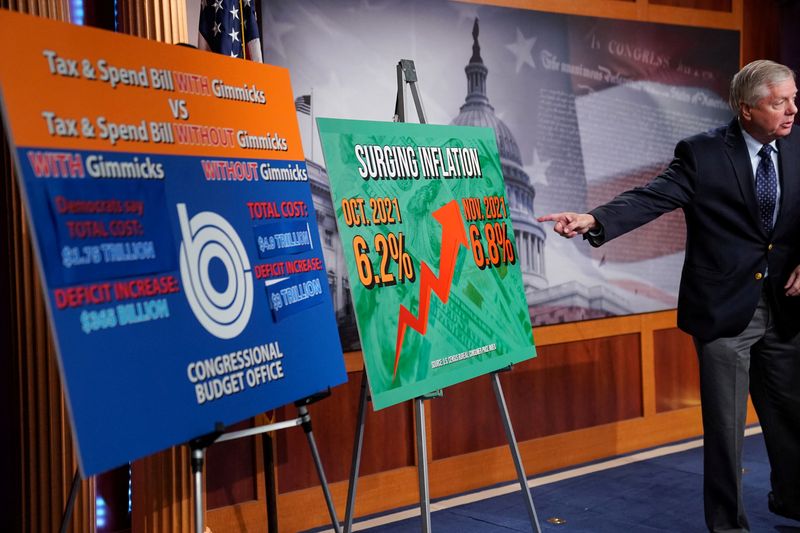WASHINGTON (Reuters) - The U.S. budget deficit will jump to $1.915 trillion for fiscal 2024, topping last year's $1.695 trillion gap as the largest outside the COVID-19 era, the Congressional Budget Office said on Tuesday, citing increased spending for a 27% increase over its previous forecast.
The CBO said in an update to its budget outlook https://www.cbo.gov/system/files/2024-06/60039-Outlook-2024.pdf that higher outlays for student loan relief, Medicaid healthcare for the poor, higher Federal Deposit Insurance Corp costs to resolve bank failures and U.S. aid to Ukraine and Israel make up the bulk of a $408 billion increase in this year's projected deficit since February, when it forecast a $1.507 trillion deficit.
If realized, the forecast for the fiscal year ended Sept. 30 would mean a second consecutive substantial deficit increase for U.S. President Joe Biden after deficits fell substantially in 2022 as COVID spending subsided.
CBO forecast that the deficit would climb further in fiscal 2025 to $1.938 trillion.
Asked later about the budget setback, White House spokesperson Karine Jean-Pierre said she had not seen the CBO update, but added that Biden was working "to do everything that he can to do the right thing when it comes to lowering the deficit."
$2 TRILLION JUMP
For the fiscal 2025-2034 decade, the CBO raised its cumulative deficit forecast to $22.083 trillion, up $2.067 trillion from the February projection.
It said debt held by the public at the end of 2034 would total $50.7 trillion, or 122% of gross domestic product, compared to the February forecast of 48.3 trillion, or 116% of GDP.
Factors pushing up the long-term deficits included $1.6 trillion in increased outlays related to recent legislative changes, including extensions of the supplemental funding of $95 billion passed this year for Ukraine, Israel and the Indo-Pacific region, CBO said.
A strengthened economic outlook reduced the long-term deficits by $600 billion over 10 years in the latest forecast, but this was also offset by a $1.1 trillion deficit increase due to technical revisions, including upward revisions to outlays for debt interest and healthcare costs. CBO now expects net interest costs to reach $1.7 trillion in fiscal 2034, up from $658 billion in 2023.
Michael Peterson, CEO of the Peter G. Peterson Foundation, which advocates for deficit reduction, said report shows that the U.S. debt challenge was getting worse.
"The harmful effects of higher interest rates fueling higher interest costs on a huge existing debt load are continuing, and leading to additional borrowing," Peterson said in a statement. "It’s the definition of unsustainable."
The estimates are based on current tax and spending laws and assume that individual tax cuts passed by Republicans in 2017 will expire on schedule at the end of 2025. Tax experts estimate that making all of these cuts permanent, which Republican presidential candidate Donald Trump has proposed, would add another $4 trillion to the 10-year deficit.
The CBO, Congress' non-partisan budget referee agency, also updated its U.S. economic projections, increasing its calendar 2024 forecast for real gross domestic product growth to 2.0% from 1.5% in February, amid stronger-than-projected activity, job growth and inflation.

The CBO projects a lower unemployment rate for 2024 at 3.9% compared to 4.2% in February and includes no Federal Reserve interest rate cuts this year.
It said a significant source of the economic improvement was due to a surge in immigration in recent years, leading to an increase of 8.7 million U.S. residents from 2021 to 2026 over historical levels. Should the trend continue, it said the surge would increase GDP by a total of $8.9 trillion, or 2.4% over the next decade. (This story has been corrected to say that the CBO raised its cumulative deficit target to $22.083 trillion, not $22.083 billion, in paragraph 6)
